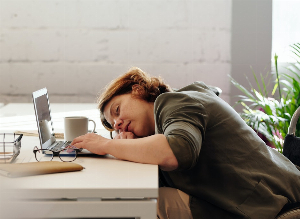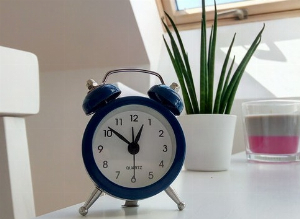Insomnia: What is it and how is it treated?
Published 13 Aug 2021 • By Aurélien De Biagi
Chronic insomnia is a condition affecting about 36% of UK adults. The proportion of people affected has decreased in recent years among men, though nearly twice as many women are likely to be affected by insomnia than men.
What is sleep and what is insomnia? How do the two impact the body? How is insomnia treated?
We explain it all in our article!

What is sleep?
Sleep is an important part of every human life. On average, we spend one third of our lives sleeping.
Moreover, sleep has an impact on several functions of our organism, including:
- Brain development in children
- Hormone production: Insulin, cortisol, appetite hormones (lack of sleep is thought to be partially responsible for the increase of obesity);
- Learning and memory reinforcement
- Stimulating immunity
Each person's sleep patterns and needs are unique. On average, an adult sleeps between 7 and 8 hours per night, although there are heavy and light sleepers. So, every person has different sleeping habits. A good night's sleep is one that makes you feel productive the next morning.
Age has an impact on sleep. In fact, with age, sleep becomes lighter and of poorer quality (micro- or full awakenings through the night). Older people also tend to fall asleep earlier and wake up earlier. Night-time sleep decreases with age and often leads to an increase in the number of naps.
What is insomnia?
Insomnia is defined as a lack of sleep or poor-quality sleep. It also has an impact on the patient's daytime activities. Difficulty concentrating, memory problems and irritability may be experienced.
There are several types of insomnia depending on the time of night affected. We can therefore distinguish between:
- Sleep onset insomnia: A common form of insomnia, this type describes difficulty falling asleep at the beginning of the night, or at the moment when the patient tries to initiate sleep, in the case of shift workers.
- Sleep maintenance insomnia: In this type of insomnia, the patient is unable to stay asleep through the night
- Early morning awakening insomnia: Like its name implies, this type of insomnia involves waking up significantly earlier than the patient desires or plans in the morning and inability to fall back asleep.
- Behavioural insomnia of childhood (BIC): Behaviourally based insomnia in children typically presents as bedtime resistance (resisting going to bed), prolonged sleep onset (resisting falling asleep), or night awakenings.
- Acute insomnia: The most common of insomnia types, this is a short-term form that lasts for a few days or up to a month. It is also commonly referred to as adjustment insomnia because it is often caused by a change in environment or a stressful life event, such as excessive noise or light, extremes of temperatures, jet lag, work or school-related stress, acute illness and allergies, certain medications, etc.
As many patients experience a mix of different sleep issues related to sleep onset, maintenance and awakening, and as insomnia symptoms tend to shift over time, it can be difficult to classify a patient's insomnia among the different types.
The most common causes of insomnia are stress and anxiety, but also environmental factors such as noise, pain, caffeine, tobacco or alcohol. Insomnia can also be a sign of depression. Hyperthyroidism, nocturnal asthma or obstructive sleep apnoea can also be implicated in insomnia.
In case of repeated or chronic insomnia (more than 3 times a week for 3 months or more), do not hesitate to consult your doctor. He or she can prescribe a treatment or treat the underlying cause of your insomnia.
It is important to note that first treatment for insomnia is a healthy lifestyle and optimal sleeping conditions. Medicinal treatment is not systematic; it can help but must be evaluated by your doctor. Indeed, many insomnia treatments can lead to drug tolerance and dependence. This is why they should be taken for as little time as possible and stopped as early as possible. In addition, treatment with sleeping pills should not be initiated without medical advice.
What are sleeping pills?
Sleeping pills are grouped into drugs known as "hypnotics". The main therapeutic class of hypnotics prescribed for this purpose is benzodiazepines (BZDs or "benzos") and their drug similars.
A distinction is made between short, medium and long-acting benzodiazepines. Short-acting benzodiazepines are prescribed for occasional or early night insomnia. The latter are used for short-term or middle-of-the-night insomnia. The third are prescribed for the treatment of late-night or chronic insomnia. BZDs take effect in around 20 minutes and should therefore be taken just before bedtime.
While they are very effective, these treatments also have drawbacks. Benzodiazepines can cause tolerance. When a patient becomes tolerant to a substance, doses will need to be increased to achieve the same effect. Furthermore, with repeated use, dependence can develop. This is why doses are increased gradually in order to find the lowest possible effective dosage.
All sleeping pills have side effects, some of which are common, such as potentially dangerous drowsiness and reduced alertness. Indeed, a delay of 7 to 8 hours is recommended between taking a sleeping pill and resuming activities requiring mental alertness.
The BZDs used for the treatment of insomnia are lormetazepam (Dormagen®), loprazolam (Dormonoct®), nitrazepam (Mogadon®) and estazolam.
Related benzodiazepines are zolpidem (Stilnoct®) and zopiclone (Zimovane®).
Another class of drugs used are antihistamines. Generally used for allergies, some antihistamines have hypnotic (sleep-inducing) properties. Antihistamines have a long duration of action which presents a risk of drowsiness during the day. However, there is no risk of addiction. Promethazine (Phenergan®, Sominex®) and doxylamine are examples of antihistamines used in this indication.
What about melatonin?
Melatonin is a hormone secreted by the epiphysis (a gland located in the brain). Naturally secreted at nightfall, its concentration increases until about 3 a.m. (between 2 and 4 a.m.) and then gradually decreases. It acts as the signal to the body that night-time has arrived and that it is time go to sleep.
This hormone acts on receptors involved in the circadian cycle (24-hour biological cycle). However, in 2012, the European health authorities (EFSA, European Food Safety Authority and the European Commission) determined that the effects of melatonin merely have an impact on falling asleep, and that melatonin-based food supplements do not improve the circadian rhythm or the quality of sleep.
Today, there is an authorised melatonin-based medicine: Circadin®. This drug is indicated for people over 55 years of age suffering from insomnia. Indeed, with age, melatonin production decreases, which can be the root of sleep disorders.
In addition, this treatment has many drug interactions. Indeed, Circadin® has been shown to enhance the sedative properties of benzodiazepines and other hypnotics such as zolpidem and zopiclone. Coadministration of these substances results in increased impairment of memory, attention and coordination. Circadin® also enhances the effects of imipramine (an antidepressant), resulting in increased tranquilizing effect and difficulty performing tasks. Melatonin also interacts with thioridazone (an anti-schizophrenic), and when combined the two can cause dizziness. In addition, antibiotics of the quinolone family, cimetidine and oestrogen therapy (contraception, hormone replacement therapy, etc.) potentiate the effects of melatonin. Conversely, smoking, alcohol, carbamazepine (an anti-epileptic) and rifampicin (an antibiotic) reduce the effects of this molecule.
Finally, a treatment with Circadin® should not exceed 13 weeks. This medication is only available on prescription for the treatment of insomnia, so do not reuse it without consulting a doctor.
Was this article helpful to you?
Share your thoughts and questions with the community in the comments below!
Take care!
Sources:
- What Are the Five Types of Insomnia?, MedicineNet
- What are the different Types of Insomnia?, Sleep Foundation
- Behavioral sleep problems in children, UpToDate
- Treatments for insomnia, NHS Inform
- Definition and contributing factors to insomnia, Sleep Foundation
- Treatments for insomnia, Sleep Foundation
- RÉSUMÉ DES CARACTÉRISTIQUES DU PRODUIT, EMA
- Les compléments alimentaires contre les insomnies, Vidal
- Les médicaments de l'insomnie, Vidal
- L'insomnie de l'adulte : définition et facteurs favorisants, Ameli
- Le traitement de l'insomnie, Ameli

 Facebook
Facebook Twitter
Twitter


